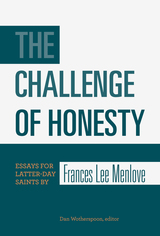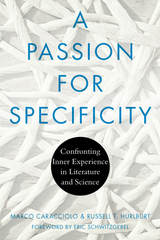3 books about Introspection

The Challenge of Honesty
Essays for Latter-day Saints by Frances Lee Menlove
Dan Wotherspoon, editor
Signature Books, 2013
In the inaugural issue of Dialogue: A Journal of Mormon Thought in 1966, Frances Menlove bravely wrote: “The very nature of the Church demands honesty, which is inherent in its mission to seek truth. What are the motives behind dishonesty? Perhaps it is the desire in everyone to protect that which they love. If one admits to past disasters, misdirection, failings, then it is possible to wonder if the Church is not in some way faltering now. But if we believe that truth and knowledge have limitations, we must welcome diverse opinions, even criticisms. Only by honestly receiving and scrutinizing all positions can we come close to an understanding of the truth.”
These words remain as fresh and bracing today as they were nearly fifty years ago. The sixteen other essays and devotionals in this collection, some published here for the first time, are equally bold, exposing injustice masked as God’s will. They contain an underlying theme of personal integrity and striving for spiritual transformation. They stand perceived wisdom on its head in the same way that scripture so often does. Readers will want to share these essays with family and friends but will also find the concepts again and again occupying their own private thoughts.
These words remain as fresh and bracing today as they were nearly fifty years ago. The sixteen other essays and devotionals in this collection, some published here for the first time, are equally bold, exposing injustice masked as God’s will. They contain an underlying theme of personal integrity and striving for spiritual transformation. They stand perceived wisdom on its head in the same way that scripture so often does. Readers will want to share these essays with family and friends but will also find the concepts again and again occupying their own private thoughts.
[more]

Introspection and Contemporary Poetry
Alan Williamson
Harvard University Press, 1984
In this bold defense of so-called confessional poetry, Alan Williamson shows us that much of the best writing of the past twenty-five years is about the sense of being or having a self, a knowable personal identity. The difficulties posed by this subject help explain the fertility of contemporary poetic experiment—from the jaggedness of the later work of Robert Lowell to the montage—like methods of John Ashbery, from the visual surrealism of James Wright and W. S. Merwin to the radical plainness of Frank Bidart. Williamson examines these and other poets from a psychological perspective, giving an especially striking reading of Sylvia Plath.
[more]

A Passion for Specificity
Confronting Inner Experience in Literature and Science
Caracciolo and Hurlburt
The Ohio State University Press, 2016
In an analytical yet increasingly intimate conversation, A Passion for Specificity:Confronting Inner Experience in Literature and Science investigates the differences between experience as conveyed in literature and experience as apprehended through scientific method. Can experiences be shared? How much do language and metaphor shape experiential reports? Where is the dividing line between a humanistic and a scientific approach to experience? In a series of exchanges, Marco Caracciolo and Russell Hurlburt demonstrate that those are necessarily personal issues, and they don’t flinch—they relentlessly examine whether Caracciolo’s presuppositions distort his understanding of reading experiences and whether Hurlburt’s attachment to the method he invented causes him to take an overly narrow view of experience. Delving ever more personally, they aim Hurlburt’s experience sampling methods—beeping people to discover what was in their stream of inner experience at the moment immediately before the beep—at Caracciolo’s own experiences, an exercise that puts Caracciolo’s presuppositions to the test and leads him to discover things about experience (his own and literature’s) that he had thought impossible.
A Passion for Specificity, with its personal revelations, unexpected twists, and confrontational style, reads like an epistolary novel, but it is a serious exploration of ideas at the heart of literature and science. It is a thoughtful attempt at advancing the emerging “cognitive humanities,” clarifying a number of core issues in the cross-pollination of literature, psychology, philosophy, and consciousness science.
A Passion for Specificity, with its personal revelations, unexpected twists, and confrontational style, reads like an epistolary novel, but it is a serious exploration of ideas at the heart of literature and science. It is a thoughtful attempt at advancing the emerging “cognitive humanities,” clarifying a number of core issues in the cross-pollination of literature, psychology, philosophy, and consciousness science.
[more]
READERS
Browse our collection.
PUBLISHERS
See BiblioVault's publisher services.
STUDENT SERVICES
Files for college accessibility offices.
UChicago Accessibility Resources
home | accessibility | search | about | contact us
BiblioVault ® 2001 - 2024
The University of Chicago Press









